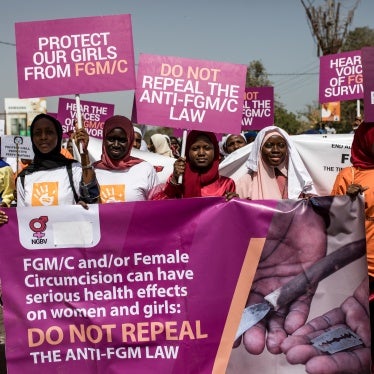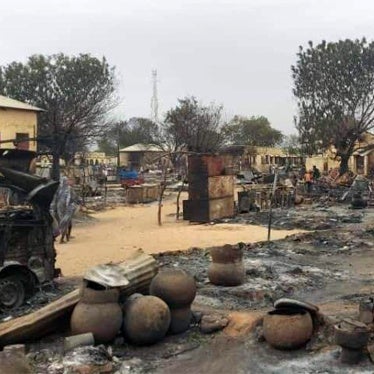Pierre sat in a chair under a large tree in his western Côte d’Ivoire village while he spoke about his family’s land, located several kilometers away. He had worked the soil, as had his father, grandfather, and great-grandfather, he explained. After Pierre and his family fled advancing armed forces in March 2011 for Liberia, where he stayed as a refugee for around eight months, a young man from a neighboring Ivorian village sold all 10 hectares of his family’s land for a quick profit, he said.
When Pierre returned from Liberia, he found his home looted and burned and strangers working in his family’s forest. His story is not uncommon in western Côte d’Ivoire, where at least hundreds of people who fled the fighting returned home only to find that their land had been illegally taken over.
Lush vegetation encroached on Pierre’s village, where around 300 people live. Many of the mud-brick houses, including Pierre’s, were partially rebuilt after their destruction during the fighting. The area’s fertile soil and tropical climate is ideal for growing coffee and cocoa, chocolate’s essential ingredient. Côte d’Ivoire is the world’s leading cocoa exporter, and many people, like Pierre, make their living growing the crop.
A middle-aged man with closely cropped hair, Pierre would rise from his chair in frustration at certain points in his story, then sink back down. He talked about how his family had long grown cocoa on part of their land, while also always leaving a large area untouched for future generations. Now, he said in defeat, the illegal occupants on the land were felling the virgin forest to plant more cocoa. As head of his family, Pierre said he was responsible for his wife and children, as well as several younger siblings. But unable to access his family’s land, where they also grew food crops, he said he struggled to grow or earn enough to feed his family and pay his children’s school fees. Because of this, some of his family still lives in a refugee camp in Liberia.
Côte d’Ivoire was split along political and ethnic lines in late 2010 and 2011, when the former president, Laurent Gbagbo, refused to leave office after the current president, Alassane Ouattara, was voted in. Armed forces on both sides committed often-horrific crimes, some of the worst occurring in the west. The violence left at least 3,000 dead.
Pierre is a member of the Guéré ethnic group, who are considered “native” to parts of western Côte d’Ivoire. As perceived supporters of Gbagbo, Pierre and other Guérés fled from advancing pro-Ouattara forces during the crisis. Many returned to their homes after prolonged displacement only to find that other Guérés, often from neighboring villages, had fraudulently sold their land, generally to Burkinabé migrants, who are seen as supporters of the current government. While some Burkinabé buyers purchased in good faith, others were at fault in the land theft – any reasonable person would have questioned the flimsy ownership claims of some illegal sellers, who were often young Guérés.
When Pierre found a number of Burkinabés working in his family’s forest, he asked them how they came to be there. They answered that another Guéré had sold them the land, giving him the name of a young man from a neighboring village.
A young man, Pierre added, who is now riding an expensive brand-new motorbike.
Before the last decade, which saw two armed conflicts in Côte d’Ivoire, many land disputes revolved around the borders between different families’ plots and were resolved by a village chief or other local authorities. But the post-election crisis has raised land conflict to a whole new level in the west. Local authorities need better support from the national government to properly investigate these claims. This support has been slow to come so far, and people who fraudulently sold land have faced no consequences, allowing the problem to mushroom.
Land conflict played a major role in Côte d’Ivoire’s descent into political and military violence. And land theft that occurred while people were displaced has increased tensions further. Human Rights Watch documented several cross-border attacks from Liberia in March that targeted people associated with illegal land sales while people were displaced.
Pierre first filed a complaint with the village chief, who issued a summons for the illegal seller to appear and resolve the dispute. This continued for 18 months, during which the illegal seller always refused to come.
Pierre now wants to take his case to the sub-prefect, a local government official, but says he can’t file a complaint because he doesn’t have the money to pay for transportation to travel some 30 kilometers to the town where the official is based.
For many who already lost so much during the crisis, the loss of their land – their ancestors’ land – is seen as the final straw. Pierre said his patience is running thin, that he can’t wait forever before taking matters into his own hands. Whether and how the government prioritizes ensuring that people like Pierre get their land back will go a long way toward determining whether large-scale violence returns to western Côte d’Ivoire.



